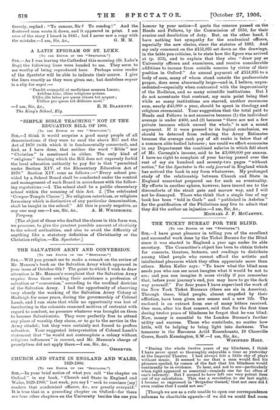CHURCH AND STATE IN ENGLAND AND WALES, 1829-1906.
[To THE EDITOR OF THE "SPECTATOR.") SIR,—In your brief notice of what you call "the chapter on .0xford " in my book, " Church and State in England and Wales, 1829-1906," last week, you say I " seek to convince [my] readers that academical officers, &c., are greatly overpaid." It is true that in a preceding chapter on Oxford—for there are four other chapters on the University besides the one you honour by your notice—I quote the censure passed on the Heads and Fellows, by the Commission of 1850, for their avarice and dereliction of duty. But, on the other hand, I have nothing but sympathy for the academical officers, especially the new clerics, since the statutes of 1882. And my only comment on the £151,935 set down as the drawings, in the table you criticise, is to state how the figure was arrived at (p. 253), and to explain that they also " draw pay as University officers and examiners, and receive considerable additions to income from outside sources by virtue of their position in Oxford." An annual payment of £151,935 to a body of men, many of whom stand outside the professoriate proper, does seem abnormally large—and is, I believe, unpre- cedented—especially when contrasted with the impecuniosity of the Bodleian, and so many scientific institutions. But I do not accentuate that contrast, my main point being that while so many institutions are starved, another enormous sum, nearly £45,000 a year, should be spent in theology and religious ceremonial. ' Your suggestion that the total paid to Heads and Fellows is not excessive because (1) the individual average is under £400, and (2) because "there are not a few private incomes which exceed the whole," is not a sound argument. If it were pressed to its logical conclusion, we should be deterred from reducing the Army Estimates because the average cash pay of all ranks is below that of a common able-bodied labourer ; nor could we effect economies in any Department the combined salaries in which fell short of Mr. Carnegie's income, said to be £3,000,000 per annum. I have no right to complain of your having passed over the rest of my six hundred and seventy-two pages "without notice," for the Spectator is the only journal in England which has noticed the book in any form whatsoever. My prolonged study of the relationship between Church and State in England somewhat prepared me for such an eventuality. My efforts in another sphere, however, have inured me to the discomforts of the strait gate and narrow way, and I will not be dismayed. Those who think that a single line of my book has been " told in Gath " and " published in Askelon" for the gratification of the Philistines may live to admit that they did the author an injustice.—I am, Sir, &c., MICHAEL J. F. McCinTmr.














































 Previous page
Previous page